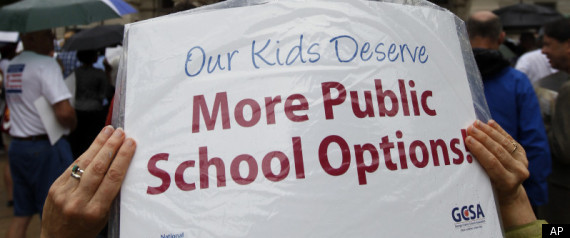Dear Rethinking Schools:
While I am neither a proponent or
opponent of charter schools en masse, I have some issues concerning Stan Karp’s
article on charter schools (“Charter Schools and the Future of Public Education,” fall 2013)
1) His
point that charters have shifted away from “community-based, educator initiated
local efforts designed to provide alternative approaches for a small number of
students,” only highlights the efforts of national charters (e.g. KIPP,
Mastery, Green Dot, et al) it does not take into account the significant
numbers of local community based charters who do have the best interest of
their students, parents and teachers at heart.
More importantly for some, it also does not highlight that there are an
increasing number of charters who are unionized.
2) If
education advocates want to eliminate or greatly reduce the influence of
high-stakes testing, why do people insist on using it as a metric to either
praise (rarely) or critique (more often) charter schools? There are a significant number of other
metrics people can cite which articulate the distinctions between all types of healthy
performing schools and those that are underperforming. For example, parent satisfaction, college
acceptance and student safety are but three metrics that could be used rather
than exclusively high stakes test scores.
3) It
is my belief, perhaps naively, that charters were never created to “take over”
a school district (acknowledging the extreme case of New Orleans as an
exception). I think it is more
appropriate to view charters as a one mechanism in the toolbox of school
choice, much like magnet schools, gifted programs, alternative schools for
pregnant girls, etc, are options for students. Why do we spend so much effort
on critiquing when we should be looking at best practices from all types of
healthy performing schools?
4) There
is an explicit,
visceral response most people feel whenever the word
“segregation” is discussed. Images of
Little Rock, the National Guard and vitriolic parents screaming racial epitaphs
and hurling rocks at black children come to mind. However, in this day and age there is a
significant
difference between state sanctioned segregation and self-selection
(e.g. the work of Freeden Oeur). If
schools are designed to serve neighborhoods, then it is imperative that we have
an honest discussion about neighborhoods and their racial and socio-economic structure. It appears as if this reasoning implies that
white (or integrated) schools are the only types of schools that can best serve
students of color.
Finally, parents and poverty. Poverty seems to be the Progressive go to
when it comes to critiquing educational choices. Poverty of the mind, of options, and
expectations for children in any educational setting, seems to be more
problematic than the distressing financial poverty many students face. While acknowledging and respecting the
obstacles and immense challenges of being financially insecure, it is
disrespectful to the sacrifices of hard working parents who want positive
academic (and social) outcomes for their children, but who themselves remain in
economic distress.
When it comes to charters and school choice, we need to
listen to, and perhaps observe, the choices parents are making. Schools of any type cannot exist without
students. If there is a proliferation of
charters and those charters are turning away students because of enlarged
waiting lists, we have to examine why this is occurring. Yes, it can be because of the influx of
influential external forces, but it can also be community driven. We must be able to have the conversation
about both the inorganic and organic forces of school choice in a more honest
and respectful manner.

Well stated!
ReplyDelete